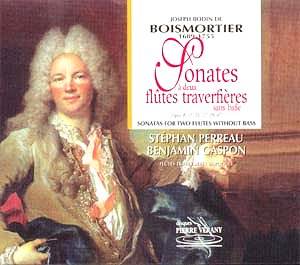 Composer: Joseph Bodin de Boismortier (1689-1755)
Composer: Joseph Bodin de Boismortier (1689-1755)
Performers: Stéphan Perreau, Benjamin Gaspon (Baroque Flutes)
Record Label: Disques Pierre Vernay
Record Number: PV700023
Recording Date: January 2001
Running Time: 48.06
In the world of Baroque music, the name of Joseph Bodin de Boismortier (1689-1755) may not resound loudly as some of his contemporaries like Vivaldi or Bach. Yet, within this disc called “Sonatas for Two Flutes without Bass” presented by Disques Pierre Vernay, one distinctly hears the refinement and emotional richness of this underrated composer. Utilizing the nuanced sonorous potentials of two baroque flutes, performed by the dexterous Stéphan Perreau and Benjamin Gaspon, Boismortier’s conversational music diverts us from its lack of bass, demonstrating the composer’s flair for dramatic contrasts, catchy melodies, and beautifully shaped phrases, all the while embracing the conversational element inherent in sonatas written for two equal voices.
The selection on this disc, recorded in January 2001, showcases Boismortier’s talent for tuneful, easily grasped melody and sophisticated compositional style. Each piece is a delightful weave of texture and tone, an airy interplay of voices that engages and entertains in equal measures. The musicians Stéphan Perreau and Benjamin Gaspon demonstrate an admirable mastery of the baroque flute, their playing characterized by limpid sound, agile technique and, most crucially, an evident understanding of the delicate aesthetic of the French Baroque.
The repertoire in itself is fascinating in that it rarely exploits the full harmonic capabilities of the two flutes; rather the focus is on a dialogue between the two instruments, with an exchange of thematic material and decorative embellishments. Throughout the course of these sonatas, Boismortier consistently manages to sustain interest through a gracious flow of melody and engaging rhythmic diversities. The sonatas are deliciously French, bearing the hallmarks of grace and lightness strongly associated with French Baroque music.
The recording quality (PV700023) is commendable, marked by a certain transparency, which allows the flutes to intertwine with precision and allows the intimacy of the music to be fully appreciated. The running time of 48.06 minutes might not be generous, but the content itself is deftly executed and meticulously realized, offering a mesmerizing fleet of sound that leaves no doubt as to Boismortier’s creative prowess or the expressive proficiency of Perreau and Gaspon.
In conclusion, this album aptly fulfills the twin objectives of illustrating the oft-overlooked repertoire for two flutes without bass in the Baroque era while giving listeners an intimate encounter with Boismortier’s exquisite craftsmanship. It is recommended for those seeking to explore the relatively unsung corners of baroque chamber music as well as admirers of historically informed performances.